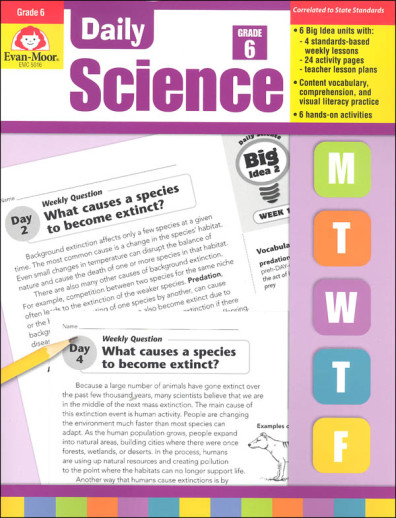We use cookies to make your experience better. To comply with the new e-Privacy directive, we need to ask for your consent to set the cookies. Learn more.
Daily Science Grade 6+
The Grade Level Teacher Book provides Teacher pages, Student Activity pages that are reproducible (for one classroom), and an answer key. This course covers: DNA and heredity; adaptations and extinctions; solar energy and weather; plate tectonics; elements and compounds; periodic table; types of energy and energy transfer.
Help your grade 6 students develop a genuine understanding of standards-based scientific concepts and vocabulary using the 150 engaging activities in Daily Science! A variety of rich resources, including vocabulary practice, hands-on science activities, and comprehension tests in multiple-choice format, help you successfully introduce students to earth, life, and physical science concepts.
30 weeks of instruction cover the following standards-based science topics:Big Idea 1: Living things are made mostly of cells. Multicellular organisms have different cells that perform specialized functions
Week 1: Can horses and zebras have babies together?
Week 2: Why are some people left-handed?
Week 3: How can corn be yellow, white, or blue?
Week 4:Are identical twins exactly alike?
Week 5: Unit Review
Big Idea 2: Changes in the environment can affect the survival of a species
Week 1: What causes a species to become extinct?
Week 2: How have crocodiles survived for millions of years?
Week 3: If the ice cap melts, why can't polar bears just adapt?
Week 4: Would humans survive if there was another ice age?
Week 5: Unit Review
Big Idea 3: The tilt of Earth's axis and energy from the sun affect seasons and weather patterns
Week 1: What causes the weather?
Week 2: Why don't hurricanes happen at the equator?
Week 3: Why are the North and South Poles so cold?
Week 4: Are the seasons reversed on the other side of the world?
Week 5: Unit Review
Big Idea 4: Earth is divided into layers: crust, mantle, and core. The crust is made up of plates and move slowly around the Earth's surface
Week 1: Why do the continents look like they fit together?
Week 2: How do scientists know what is inside Earth?
Week 3: What happens when two continents collide?
Week 4: What will Earth's surface look like in the future?
Week 5: Unit Review
Big Idea 5: Matter is made up of tiny particles called atoms. Different arrangements of atoms compose all substances
Week 1: What do atoms look like?
Week 2: What is the periodic table?
Week 3: What is water made of?
Week 4: How are living things different from nonliving things?
Week 5: Unit Review
Big Idea 6: Energy can be mechanical, electrical, thermal, or chemical
Week 1: How do windmills make electricity?
Week 2: What makes popcorn pop?
Week 3: What makes fireflies glow?
Week 4: How do fireworks work?
Week 5: Unit Review
Providing daily supplemental activity pages for elementary to early middle school, this Evan-Moor series reinforces scientific knowledge, reading comprehension and vocabulary development. Short, 10-15-minute activities organized around reading passages are easy to implement and schedule into your educational day.
Organized into 6 topical Big Ideas Units each investigating a question from life, earth, or physical science and based on state standards. Each Unit is 5 weeks long, with Weeks 1-4 providing teaching on the key information. Weekly lessons begin with a Teacher Page that provides additional information and activity ideas. Student Activity pages follow. Days 1-4 include a variety of writing, comprehension, vocabulary, critical thinking, visual literacy, oral language practice or hands-on activities. Day 5 is review. Week 5 is considered a Unit review with comprehension questions, visual literacy activity, vocabulary review and a hands-on activity related to the previous 4 weeks. From a secular publisher, there is evolutionary content. ~ Deanne
The Grade Level Teacher Book provides Teacher pages, reproducible (for one classroom) Student Activity pages, and an answer key. 192 pgs. pb
The Student Practice Book (Student Workbook) provides only the Student Activity pages. This book is not reproducible and does not include the answer key. It is designed to be used with an additional student or instead of copying the Student pages from the Teacher book.
| Product Format: | Paperback |
|---|---|
| Brand: | Evan-Moor |
| Grade: | 6 |
| ISBN: | 9781596739307 |
| EAN/UPC: | 023472050168 |
| Length in Inches: | 10.875 |
| Width in Inches: | 8.5 |
| Height in Inches: | 0.5 |
| Weight in Pounds: | 1.2 |

